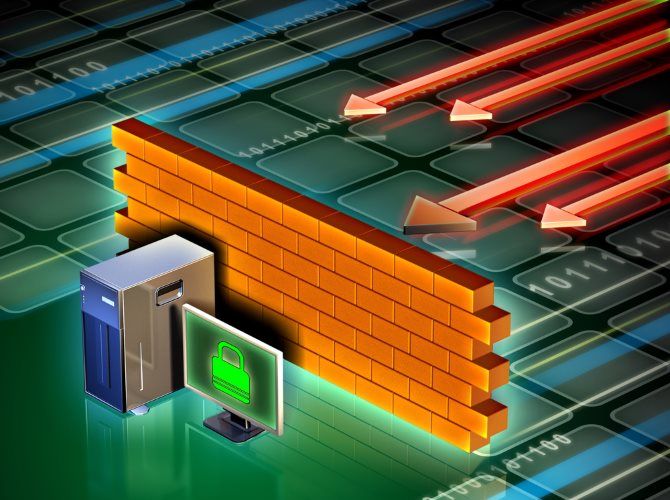As the technology around us evolves, firewalls have had to take to the cloud to keep up with it. But what is a cloud firewall, and should you get one yourself?
Let's look into what firewalls do, and why you'd want to put one in a cloud.
What Is a Firewall?
Firewalls get their name after the real-world building firewalls which stop flames from spreading through a building. You'll find firewalls in data transfer hubs, where they can check for any malicious activity.
You'll find firewalls in your own home network, too. Typically, your router and computers will have firewalls that keep an eye on connections going in and out. You can use the built-in firewall with your operating system, or you can try a third-party firewall instead.
Firewalls stop people accessing your network from the outside without your permission. If it detects something potentially malicious, it blocks the connection and protects your PC from the source.
You can also set custom rules for your firewall, so it blocks things you don't want people seeing on your network. For instance, it can be used by employers to prevent their workers from seeing things they shouldn't.
How Firewalls Set Up a Perimeter
In the cybersecurity world, there's a security concept called the "perimeter." The perimeter is the imaginary "digital wall" set up around your network to keep malicious agents at bay.
For example, let's imagine you're running a network for a small business. It contains ten computers, all of which connect to a central router that goes out to the internet.
To set up the network security properly, you need to give the firewall the right rules. You tell the router's firewall to allow everyone within the office access to the router. Furthermore, you deny everyone from the outside entry into your network. In other words, it's like a castle; everyone inside the walls is welcome, and everyone outside is kept out.
This layer of protection is what a perimeter is; the "wall" that you set up around your network. All the computers and servers that are on the office premises (known as "on-prem") are known to be safe, and everything not on-prem isn't safe.
How Perimeters Can Fall Apart
Things don't look as clean-cut when you think about the practicalities of having everything on-prem. These days, employees can remote-work from anywhere in the world. Businesses take on services that use their on-prem servers, which require communications from outside the perimeter.
Now that the border has increased, we can no longer realistically draw a circle around a group of computers and servers and call it a "perimeter." With authorized people connecting to on-prem servers from the outside, as well as people in the office using services outside of the company, the border of our perimeter could very well span across the entire globe!
With this vast perimeter, on-prem firewalls don't cut it. We need a cloud-based firewall which can support international traffic coming from a variety of different sources.
How Cloud-Based Firewalls Help Businesses
Cloud-based firewalls mean businesses don't have to depend on on-prem services and can instead shift their firewall wherever they like. They have a choice between two kinds of firewalls:
- The business can rent out a firewall located on a cloud. They can then set this up just like they would with an on-prem firewall, except this one is cloud-based. These are typically called Firewalls-as-a-Service (FWaaS), where a company can rent out a dedicated cloud-based firewall for their business.
- If the business is brave enough, they can rent out a server and set up their firewall. Businesses usually achieve this by renting out a server and installing security software on it. To do this, they use Infrastructure-as-a-Service (IaaS) to rent the space needed for the firewall.
In short, businesses have two choices; they can rent a cloud-based firewall, or they can make their own. This choice is like hiring a company to set up security cameras and monitor your home, versus setting up a CCTV system yourself.
Your eagerness to set up a firewall by yourself should dictate which one you choose. For example, if you don't know your ports from your firewall rules, you're probably best off hiring a company with an already fully-functioning firewall.
On the other hand, you can't stand the idea of your business' firewall being someone else's responsibility, definitely make your own.
4 Benefits of Cloud-Based Firewalls
1. They're Easy to Configure
First of all, cloud-based firewalls are much more modular than regular firewalls. They're designed to handle all different kinds of communications.
For example, if you want to direct user traffic through a firewall, a cloud-based firewall can do that. If you want something that can protect you from attacks, it can do that, too. The firewall can scale to your demands; say what you want from it, and it'll do it.
2. Cloud Firewalls Evolve Alongside You
Another reason to pick a cloud-based firewall is that they can evolve as your business grows. For example, you want to attach more offices, data centers, or websites to the firewall, you can hire more server space to get the resources you need. It's a scalable solution that doesn't stunt business growth and allows you to stop worrying about hardware space on-prem.
3. Firewalls-as-a-Service Receive Automatic Updates
If you're using an FWaaS, the company providing your firewall can monitor the internet and keep tabs on the malware forecast. This service includes "zero-day threats"; viruses published on that day which take antivirus companies by surprise. If you use a reputable FWaaS, the company behind it will patch and fix your firewall when they find these threats.
4. Infrastructure-as-a-Service Firewalls Can Have Extra Space
If you're using a firewall based on an IaaS, you can utilize the free space on the server for other things. For example, you can store data on it, host a site on it, set up virtual machines on it; it's up to you. As a result, while the IaaS route puts more pressure on you to keep things secure, it also gives you the freedom to use the servers as you desire.
Disadvantages of Cloud Firewalls
Unfortunately, putting a firewall on a cloud means it's susceptible to outages. For instance, your FWaaS provider or server goes down, and you depend on it to check your company's traffic for malicious agents, your entire business' network can grind to a halt in an instant. That's why it's so important to choose an excellent service; or at least, have a backup plan when things go wrong.
Regardless, You Should Be Using a Firewall
Cloud-based firewalls are an excellent option for anyone who needs adaptive protection. If you hire out a firewall or make your own, they can be a valuable asset as your network's security perimeter gets larger and larger.
There are plenty of reasons why you should use a firewall, so be sure to check them!


